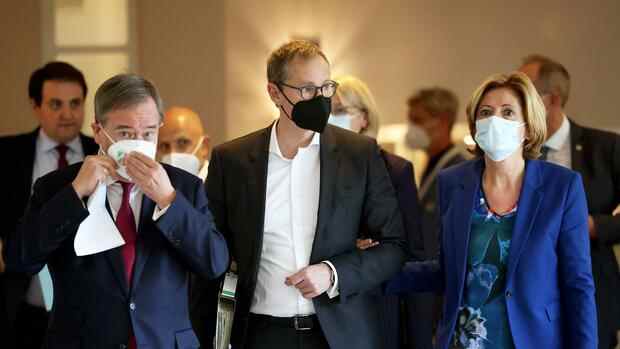Berlin The federal states have warned of the end of the “epidemic situation”, which, according to a proposal by Federal Health Minister Jens Spahn (CDU), should no longer be extended at the end of November. This emerges from a resolution of the Conference of Prime Ministers (MPK) in Koenigswinter on Friday.
Low-threshold measures could and should prevent a renewed increase in the number of infections, it says. Otherwise, a massive increase in the number of infections could “make significantly more stringent measures necessary” again.
Spahn had spoken out in favor of not continuing the determination of an epidemic situation of national importance beyond November 25th. This determination is the basis for regulations and central corona measures in Germany.
It is true that the states also have the option of maintaining such measures through resolutions of their state parliaments. However, several Prime Ministers warned on the fringes of the MPK of a “patchwork quilt” and the associated lack of acceptance.
“The expectation of the Prime Minister’s Conference is that the federal government will ensure that there is still a legal basis for the measures after November 25th,” said the North Rhine-Westphalian Prime Minister Armin Laschet (CDU) on Friday at the end of the deliberations. Laschet had taken over the chairmanship of the body from the Berlin Mayor Michael Müller (SPD).
Concern about increasing numbers of infections
If every country has to determine corona measures itself, this will lead to upheavals. Laschet mentioned the mask requirement, keeping your distance and the 2G and 3G rule, with which only convalescent, vaccinated and tested people have access to indoor spaces. According to Laschet, there has been a stable infection process for weeks. “Now we are noticing nationwide that there is a marked increase.”
The seven-day incidence in Germany is increasing rapidly and is currently 95.1. According to the Robert Koch Institute (RKI), the number of new infections is 19,572. A week ago the value was 11,518 infections. The value that is decisive for measures – the hospitalization rate – has also risen across Germany.
It is 2.45 and indicates how many people per 100,000 people with a corona disease are admitted to hospitals within a week. The previous high was around Christmas 2020 at more than 15.
Regions in south-east Germany are particularly affected – as in Saxony, Thuringia and Bavaria, the vaccination rates are significantly lower. According to the RKI, the seven-day incidence in Thuringia is now 192.7, in Bavaria 153.9 and in Saxony 142.5. In the districts of Berchtesgadener Land, Traunstein and Mühldorf am Inn, the seven-day incidence is over 400.
Booster vaccination debate
In Germany, up to and including Thursday, 69.1 percent of the total population were vaccinated against Corona at least once, according to the federal government. 66.1 percent now have complete vaccination protection. The RKI had pointed out, however, that the vaccination quota is likely to be a few percentage points higher because not all company doctors reported their vaccinations.
The progress in booster vaccinations is a cause for concern. It has been offered in nursing homes since September. The Standing Vaccination Commission (Stiko) recommends it for people who had a second vaccination more than six months ago, who are at least 70 years old or who have a weakened immune system.
According to the Central Institute of Statutory Health Insurance (ZI), 1.5 million people have received this type of booster vaccination so far. “Considering the 4.1 million people who had received two vaccinations by March 31, that is far too little,” said ZI boss Dominik Stillfried to the Handelsblatt.
Currently around 250,000 people received the third vaccination a week. “This pace should be increased urgently,” said Stillfried. Until December, twice as many vaccinations per week are necessary to meet the Stiko recommendation.
The President of the Federal Association of Private Providers of Social Services, Bernd Meurer, demanded that the federal states have to ensure that general practitioners offer a nationwide range of vaccinations. “Where that doesn’t work, mobile vaccination teams have to be deployed again and sent to the care facilities.”
In some districts, incidences well above 100 were reported among those over 80. “So now we have to act more decisively,” he said. The health policy spokeswoman for the FDP, Christine Aschenberg-Dugnus, also called for a “vaccination booster campaign”.
More: What the end of the “epidemic situation” means
